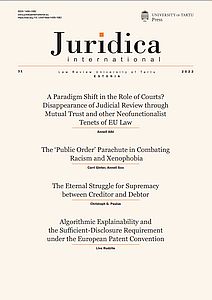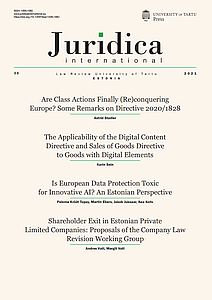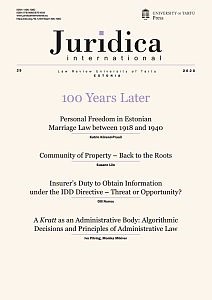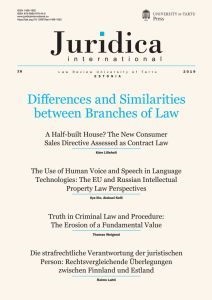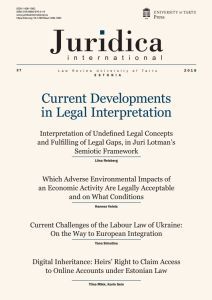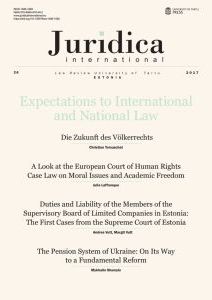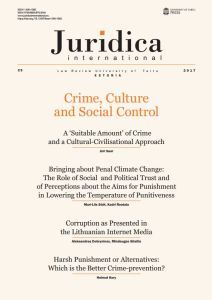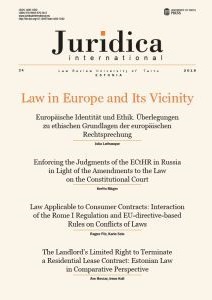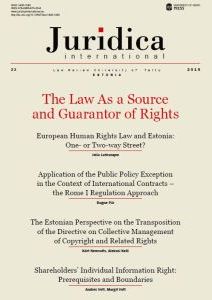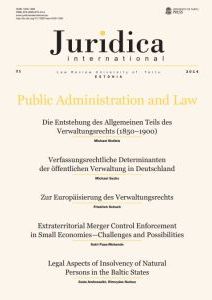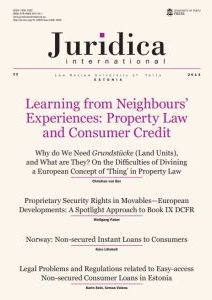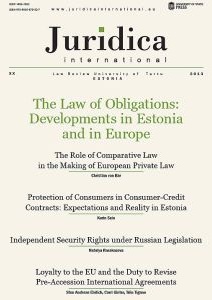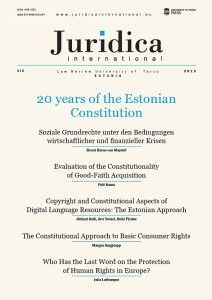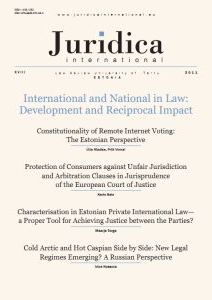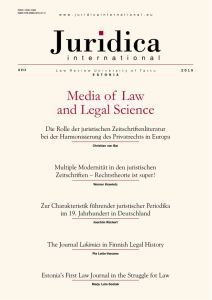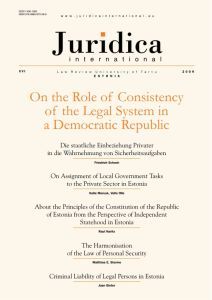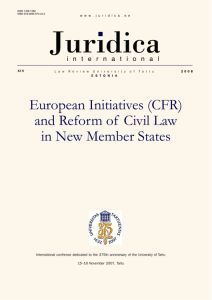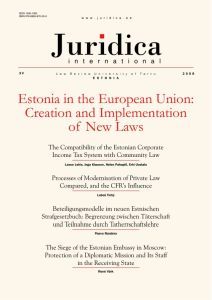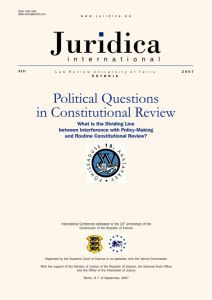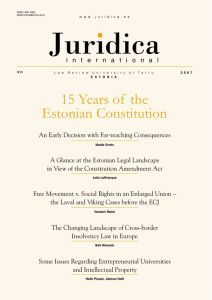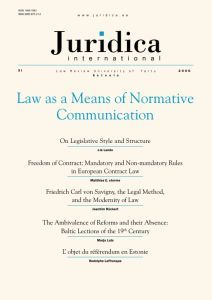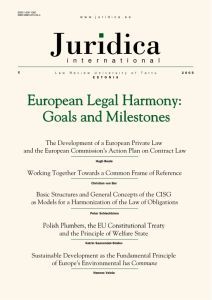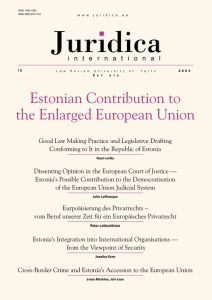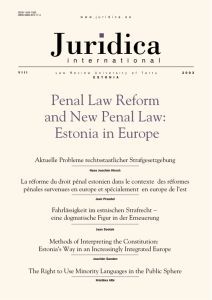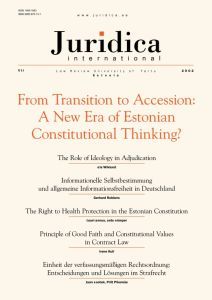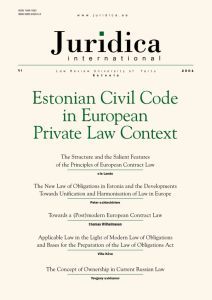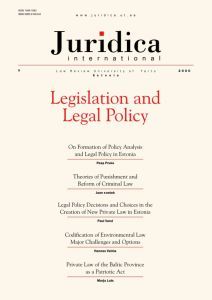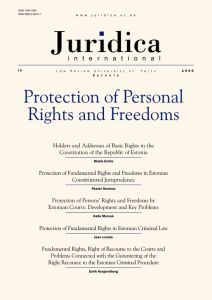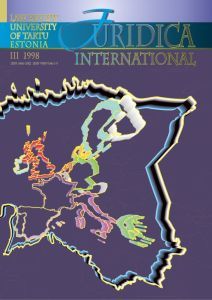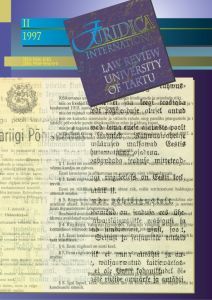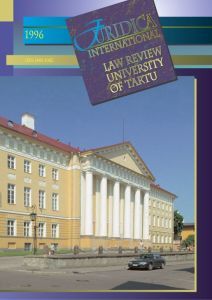Archive items
An Empirical View of the Extent of Exercising the Education Exception to Copyright in Cultural Heritage Institutions
Aleksei Kelli, Margus Pedaste, Äli Leijen
pp. 3-21
A Comparative Approach to Amendments to Constitutional Preambles: Questions of Amendability, Substance, and Reasons
Kristel Urke
pp. 22-40
Data-driven Public Administration and the GDPR: Seeing the Court of Justice's Judgement in Case C-175/20 in a Broader Context
Monika Mikiver, Nele Siitam
pp. 52-61
Time of Signing: Legal Requirements and Technical Options for Hand-written and Electronic Signatures
Laura Kask
pp. 62-76
Preserving Secrecy within the Patent System to Safeguard Western Countries’ Technological Innovation
Lisette Põld
pp. 77-88
The Effect of European Union Law on the Criminal and Quasi-Criminal Liability of Legal Persons in Estonia
Priit Pikamäe, Markus Kärner
pp. 89-101
The Triumph of Soft Law in the Financial Sector: Can Non-binding Law Have Binding Domestic Legal Effects?
Siim Tammer
pp. 102-110
The Interplay between EU Competition Law and Professional Sports: Recent Developments and Their Potential Impact on Small States
Natalia Mäekivi
pp. 111-120
Alternatives to Public Procurement: Free Choice in Marketised Social Services – Legal Challenges Illustrated via Long-Term Care
Mari-Liis Viirsalu
pp. 121-132
The Author’s Right of Integrity in Public Contracts in Estonia Based on Architectural Work
Gerli Helene Gritsenko
pp. 144-163
Can Civil Courts Save the Climate? Strategic Climate-change Litigation Before Civil Courts
Astrid Stadler
pp. 3-12
Emerging Challenges to Public Procurement: Covid-19 and Regulatory Approaches to Public Contracting in the EU, the United Kingdom, and France
Şimal Efsane Erdoğan, Oana Ştefan
pp. 13-29
An Overview of the Recent Case Law of the Constitutional Court of the Republic of Latvia
Jānis Neimanis
pp. 56-63
pp. 64-73
An Empirical View of the Extent of the Use of the Education Exception to Copyright
Aleksei Kelli, Margus Pedaste, Äli Leijen
pp. 74-86
From Tradition to Evidence: Rethinking the Law on Eyewitness Identification in Estonia
Annegrete Palu, Anneli Soo
pp. 87-106
pp. 107-118
pp. 3-47
On the Field of Application of Sociology of Law to Law-making and Impact Assessment (The Experience of Estonia)
Silvia Kaugia, Raul Narits
pp. 68-80
Rebuilding the Court System of Estonia after the Communist Regime
Katre Luhamaa, Merike Ristikivi
pp. 81-89
The Independence of the Judiciary: Meaning and Threats
Jesús Manuel Villegas Fernández, Victoria Rodríguez-Blanco
pp. 90-97
pp. 98-110
pp. 111-124
Algorithmic Explainability and the Sufficient-Disclosure Requirement under the European Patent Convention
Liva Rudzite
pp. 125-135
From Child to Adult Victims and Witnesses: Ways of Improving the Quality of Investigative Interviews
Mari-Liis Tohvelmann, Kristjan Kask
pp. 136-146
pp. 147-150
Zehn Jahre gemeinsame rechtswissenschaftliche Seminare Tartu-Konstanz – eine Erfolgsgeschichte!
Astrid Stadler
pp. 5-6
Ten Years of Tartu–Konstanz Co-operation: Joint Seminars on Private Law and Successfully Defended Doctoral Theses in the Faculty of Law of the University of Tartu
Irene Kull, Merike Ristikivi
pp. 7-13
pp. 14-22
pp. 23-31
Qualification of Consumer Contracts for the Supply of Digital Services under Estonian Law
Kristiina Koll
pp. 40-48
pp. 49-58
pp. 59-70
The Legal Meaning of a Detailed Spatial Plan in the Context of the Fundamental Right of Ownership
Heili Püümann
pp. 81-89
Zum kollisionsrechtlichen Umgang mit sachenrechtlichen Eigentumsvermutungen aus dem Besitz
Aleksandar Zivanic
pp. 90-98
Is European Data Protection Toxic for Innovative AI? An Estonian Perspective
Paloma Krõõt Tupay, Martin Ebers, Jakob Juksaar, Kea Kohv
pp. 99-110
pp. 123-131
pp. 132-139
Shareholder Exit in Estonian Private Limited Companies: Proposals of the Company Law Revision Working Group
Andres Vutt, Margit Vutt
pp. 140-151
pp. 152-163
pp. 164-173
The Relationship between EU Law and Fundamental Principles of Estonian Substantive Criminal Law
Kaie Rosin
pp. 174-182
Russian Approaches to the Right of Peoples to Self-Determination: From the 1966 United Nations Covenants to Crimea
Sevanna Poghosyan
pp. 183-193
pp. 194-207
pp. 23-33
pp. 34-46
A Kratt as an Administrative Body: Algorithmic Decisions and Principles of Administrative Law
Ivo Pilving, Monika Mikiver
pp. 47-61
Regulating the Unregulatable: An Estonian Perspective on the CLOUD Act and the E-Evidence Proposal
Eneli Laurits
pp. 62-70
The Use of Human Voice and Speech for Development of Language Technologies: the EU and Russian Data-protection Law Perspectives
Ilya Ilin, Aleksei Kelli
pp. 71-85
pp. 108-123
The Child’s Autonomy in Decision-making on Medical Treatment: Theoretical Considerations
Kristi Paron
pp. 124-132
pp. 133-141
pp. 3-8
pp. 9-16
The Use of Human Voice and Speech in Language Technologies: The EU and Russian Intellectual Property Law Perspectives
Ilya Ilin, Aleksei Kelli
pp. 17-27
pp. 28-36
Reforms of the Criminal Sanctions System in Germany – Achievements and Unresolved Problems
Frieder Dünkel
pp. 37-48
pp. 59-63
Superior Responsibility in Estonian Criminal Law and its Compliance with International Law
Andres Parmas
pp. 64-78
Criminal Liability of Third Parties with Regard to Free-Responsible Suicide: New Developments in the German Jurisdiction
Henning Lorenz
pp. 79-85
The Principle of Trust for Exceptions to the Non-Regression Clause in the Case of Delict of Negligence
Laura Feldmanis
pp. 86-94
The Concept of Recovery of Credit Institutions in the Bank Recovery and Resolution Directive
Märt Maarand
pp. 103-111
pp. 112-121
Interpretation of Undefined Legal Concepts and Fulfilling of Legal Gaps, in Juri Lotman’s Semiotic Framework
Liina Reisberg
pp. 3-11
pp. 36-40
Limitation of Freedom of Speech and of the Press by Penal Law in the Final Decades of the Russian Empire
Olja Kivistik, Marju Luts-Sootak
pp. 41-52
Land Reform and the Principle of Legal Certainty: The Practice of the Supreme Court of Estonia in 1918–1933
Karin Visnapuu
pp. 53-60
Which Adverse Environmental Impacts of an Economic Activity Are Legally Acceptable and on What Conditions
Hannes Veinla
pp. 61-68
Shareholders’ Draft Resolutions in Estonian Company Law: An Example of Unreasonable Transposition of the Shareholder Rights Directive
Andres Vutt, Margit Vutt
pp. 69-78
Tasks and Responsibilities of an Employer in a Digital Age: How to Comply with the Applicable Requirements for Work Conditions
Gaabriel Tavits
pp. 79-87
pp. 88-93
Identification of Provoked State in Estonian County Court Rulings of 2006–2016
Kristjan Kask, Liisa Tarkus, Alina Harkovskaja
pp. 94-103
Towards a Single Government Approach via Further Consolidation of Law and Order in Estonia, with Domestic Violence as an Example
Raul Narits, Silvia Kaugia, Iris Pettai
pp. 104-116
Digital Inheritance: Heirs’ Right to Claim Access to Online Accounts under Estonian Law
Tiina Mikk, Karin Sein
pp. 117-128
Restraining at Care Institutions Evaluated from the Standpoint of Penal Law
Erkki Hirsnik, Marje Allikmets
pp. 129-157
The Patient’s Will – Why and for Whom? Forms, Formalisation, and Implementation Issues
Maret Kruus, Rainis Int, Ants Nõmper
pp. 158-169
pp. 170-179
Das im Generalgouvernement in den Jahren 1939–1945 angewandte materielle Strafrecht
Andrzej Wrzyszcz
pp. 25-33
A Look at the European Court of Human Rights Case Law on Moral Issues and Academic Freedom
Julia Laffranque
pp. 34-46
Provision of Health-care Service over the Internet – the Legality of E-consultations in Estonia
Marika Žmenja
pp. 47-55
Legal Arrangements Similar to Trusts in Estonia under the EU’s Anti-money-laundering Directive
Katrin Sepp
pp. 56-65
Duties and Liability of the Members of the Supervisory Board of Limited Companies in Estonia: The First Cases from the Supreme Court of Estonia
Andres Vutt, Margit Vutt
pp. 66-75
Court Supervision of the Determination of the Votes at the First General Meeting of Creditors in Estonian Bankruptcy Law
Mari Schihalejev
pp. 76-84
Die Verantwortungsstruktur bei der Privatisierung der Rehabilitationsleistungen im estnischen Sozialrecht
Mari-Liis Viirsalu
pp. 94-102
pp. 113-124
A Review of Magda Papede’s Verwertungsgesellschaften im europäischen Kontext – Das Beispiel der baltischen Staaten
Thomas Hoffmann
pp. 125-126
pp. 127-127
Explaining the Relationship between Social Trust and Value Similarity: The Case of Estonia
Mai Beilmann, Laur Lilleoja
pp. 14-21
Soziale Werte in der soziologischen und kriminologischen Forschung: Überlegungen zum Begriff und Operationalisierung
Olga Siegmunt
pp. 22-31
Bringing about Penal Climate Change: The Role of Social and Political Trust and of Perceptions about the Aims for Punishment in Lowering the Temperature of Punitiveness
Mari-Liis Sööt, Kadri Rootalu
pp. 32-42
Corruption as Presented in the Lithuanian Internet Media
Aleksandras Dobryninas, Mindaugas Gilaitis
pp. 43-53
Life without Crime as a Fundamental Right of the Child: On the Prevention of Juvenile Delinquency
Ilona Kronberga
pp. 74-81
How Young/Old Does One Look? Sales Personnel’s and Laypersons’ Estimation of Young People’s Age
Kristjan Kask, Mariliis Tael-Öeren
pp. 82-90
pp. 91-99
Europäische Identität und Ethik. Überlegungen zu ethischen Grundlagen der europäischen Rechtsprechung
Julia Laffranque
pp. 3-13
Enforcing the Judgments of the ECtHR in Russia in Light of the Amendments to the Law on the Constitutional Court
Kerttu Mäger
pp. 14-22
pp. 23-31
pp. 32-42
The Concept of Beneficial Owner in Application of the Ukrainian Double Taxation Treaties
Leonid Tymchenko, Pavlo Selezen
pp. 55-62
Law Applicable to Consumer Contracts: Interaction of the Rome I Regulation and EU-directive-based Rules on Conflicts of Laws
Ragne Piir, Karin Sein
pp. 63-70
The Landlord’s Limited Right to Terminate a Residential Lease Contract: Estonian Law in Comparative Perspective
Ave Hussar, Irene Kull
pp. 71-83
The Estonian Foundation – What is Missing for It to Be A Well-Designed Wealth-Management Vehicle for Local and Foreign High-Net-Worth Individuals?
Katrin Sepp, Urmas Kaarlep
pp. 96-104
pp. 105-115
pp. 116-127
The Significance of Recognising Domestic Violence, in Light of Estonian Legal Experts’ Opinion and the Prospects for Systematising the Relevant Legislation
Raul Narits, Silvia Kaugia, Iris Pettai
pp. 128-138
pp. 17-25
pp. 26-32
The Estonian Perspective on the Transposition of the Directive on Collective Management of Copyright and Related Rights
Kärt Nemvalts, Aleksei Kelli
pp. 33-42
The Health-care Provider’s Civil Liability in Cases of Wrongful Life: An Estonian Perspective
Dina Sõritsa
pp. 43-51
pp. 52-59
Shareholder's Individual Information Right: Prerequisites and Boundaries
Andres Vutt, Margit Vutt
pp. 60-69
Available Options for Funding the Insolvency Proceedings of Corporate Debtors
Kersti Kerstna-Vaks
pp. 78-86
pp. 87-97
Legal Remedies Available to Competitors of Recipients of Unlawful State Aid under Estonian Law
Mari Kelve-Liivsoo, Artur Knjazev, Tea Kookmaa
pp. 98-109
pp. 124-132
The Analysis of Complex Forensic Psychiatry and Psychology Expert Assessments in Estonia
Kristjan Kask, Sandra Salumäe
pp. 133-141
pp. 5-20
pp. 21-28
pp. 29-45
pp. 46-57
pp. 58-68
Warum wir an der Universalität der westlichen Werte festhalten sollten
Christoph Conrad Henke
pp. 118-129
Extraterritorial Merger Control Enforcement in Small Economies— Challenges and Possibilities
Katri Paas-Mohando
pp. 137-146
The Buyer’s Right to Require Reimbursement for Repair Costs of Defective Goods under the CISG, the CESL, and Estonian Law
Arsi Pavelts, Karin Sein
pp. 147-158
Formation of Creditor Groups in Reorganisation Proceedings: Does Estonia Need a Better Regulation?
Mari Schihalejev
pp. 159-167
Personal Liability of a Director to Creditors in the Case of Thin Capitalisation of a Company
Leonid Tolstov
pp. 168-175
Legal Aspects of Insolvency of Natural Persons in the Baltic States
Goda Ambrasaitė, Rimvydas Norkus
pp. 176-185
pp. 186-196
pp. 197-205
pp. 206-217
Why do We Need Grundstücke (Land Units), and What are They? On the Difficulties of Divining a European Concept of ‘Thing’ in Property Law
Christian von Bar
pp. 3-15
The Scandinavian Approach to Property Law, Described through Six Common Legal Concepts
Claes Martinson
pp. 16-26
Proprietary Security Rights in Movables—European Developments: A Spotlight Approach to Book IX DCFR
Wolfgang Faber
pp. 27-36
Regulation of Instant Loans and Other Credits in Swedish Law
Annina H. Persson, Ann-Sofie Henrikson
pp. 57-70
The Way to Over-indebtedness—Intensive Marketing, Easy Access to Loans, and Insufficient Legislation (Denmark)
Tanja Jørgensen
pp. 71-95
Legal Problems and Regulations related to Easy-access Non-secured Consumer Loans in Estonia
Karin Sein, Urmas Volens
pp. 120-137
pp. 138-148
The Future of Consumer Credit in Lithuania: Quo vadis, Consumer Credit?
Danguolė Bublienė
pp. 149-167
pp. 12-19
Protection of Consumers in Consumer-Credit Contracts: Expectations and Reality in Estonia
Karin Sein
pp. 32-40
pp. 41-51
Should Price Reduction be Recognised as a Separate Contractual Remedy?
Piia Kalamees, Karin Sein
pp. 52-60
Fitting the Estonian Notions of Contractual and Non-contractual Obligations under the European Private International Law Instruments
Irene Kull, Maarja Torga
pp. 61-68
pp. 69-74
pp. 75-84
Kommissionsvorschlag zur Klärung der Vermögens verhältnisse bei internationalen Paaren und mögliche Folgen
Kristel Degener
pp. 112-120
Loyalty to the EU and the Duty to Revise Pre-Accession International Agreements
Sten Andreas Ehrlich, Carri Ginter, Triin Tigane
pp. 121-132
pp. 133-141
pp. 142-151
Popular Initiatives as Means of Altering the Core of the Republic of Latvia
Kristīne Jarinovska
pp. 152-159
Problems of Estonian Local Government in 2013 and Co-operation as an Instrument of Their Resolution
Kalle Merusk, Vallo Olle
pp. 160-168
Operators’ General Obligations as an Environmental Duty of Care
Hannes Veinla, Siim Vahtrus
pp. 169-178
Principles of Debt Restructuring and Restrictions on Initiation of Debt Restructuring Proceedings
Toomas Saarma
pp. 179-187
pp. 188-196
pp. 206-214
State Fees: Is the Legislator Free in Setting the Rates of State Fees? An Estonian Example
Kai Härmand
pp. 215-221
Das römischrechtliche precarium im deutsch-baltischen und estnischen Recht: eine Besonderheit aus der estnischen Rechtsgeschichte
Marju Luts-Sootak, Hesi Siimets-Gross
pp. 222-230
Soziale Grundrechte unter den Bedingungen wirtschaftlicher und finanzieller Krisen
Bernd Baron v. Maydell
pp. 5-10
pp. 11-22
pp. 32-39
Copyright and Constitutional Aspects of Digital Language Resources: The Estonian Approach
Aleksei Kelli, Arvi Tavast, Heiki Pisuke
pp. 40-48
pp. 68-77
pp. 88-98
The Importance of the Structure of the Insolvency System for Facilitation of Business Operators’ Reorganisation
Kadriann Habakukk
pp. 99-106
pp. 135-144
Prospectus Liability v. Criminal Punishment: The Case of Public v. Private (But without Enforcement)
Marko Kairjak
pp. 145-153
Die schuldhafte strafrechtliche Verantwortung der juristischen Person. Theoretische Grundlagen und estnische Gerichtspraxis
Priit Pikamäe, Jaan Sootak
pp. 154-160
pp. 161-169
The Right of the Suspect to Counsel in Pre-trial Criminal Proceedings, Its Content, and the Extent of Application
Jaan Ginter, Anneli Soo
pp. 170-178
Mortality Rate and Causes of Death of Delinquent Individuals: Data from the Estonian Longitudinal Study of Criminal Careers
Jüri Saar, Anna Markina
pp. 179-186
BOOK REVIEW: Prof. Dr. Bob Wessels, International Insolvency Law 3rd ed., Kluwer, Deventer, 2012
Paul Varul, Signe Viimsalu
pp. 187-188
Constitutionality of Remote Internet Voting: The Estonian Perspective
Ülle Madise, Priit Vinkel
pp. 4-16
Referendum in the Estonian Constitution: Historical and Comparative Constitutional Aspects
Ero Liivik
pp. 17-26
International Standards for Social Security and Their Fulfilment in Estonia: Changes in Pension and Health Insurance and Their Constitutionality
Gaabriel Tavits
pp. 27-34
Applying the Concept of Better Regulation to Internal Security Policy
Annika Talmar-Pere, Raul Narits, Aare Kasemets
pp. 35-43
The Notion of Consumer in EU Consumer Acquis and the Consumer Rights Directive—a Significant Change of Paradigm?
Margus Kingisepp, Age Värv
pp. 44-53
pp. 54-62
pp. 63-72
Do the Principles of European Insurance Contract Law Go Too Far in Protecting the Policyholder?
Olavi-Jüri Luik
pp. 73-83
Characterisation in Estonian Private International Law—a Proper Tool for Achieving Justice between the Parties?
Maarja Torga
pp. 84-93
pp. 94-103
pp. 104-112
Cold Arctic and Hot Caspian Side by Side: New Legal Regimes Emerging? A Russian Perspective
Irina Nossova
pp. 113-120
Definition of an Environmental Organisation in the Arhus Convention, Environmental Directives and Estonian Law
Kaarel Relve
pp. 121-131
Problems in Transposing the European Union’s Nature Conservation Directives into Estonian Law and Plans for Solving Them
Hannes Veinla
pp. 132-141
pp. 142-151
pp. 152-160
Comparison of Knowledge of Law Enforcement and Lay People Regarding Eyewitness Testimony
Kristjan Kask
pp. 161-172
FIDE—Uniting Great Minds of European Law: 50 years of the International Federation for European Law
Julia Laffranque
pp. 173-181
Iurisprudentia est divinarum atque humanarum rerum notitia, iusti atque iniusti scientia
Raul Narits
pp. 182-183
Die Rolle der juristischen Zeitschriftenliteratur bei der Harmonisierung des Privatrechts in Europa
Christian von Bar
pp. 4-10
pp. 11-18
Zur Charakteristik führender juristischer Periodika im 19. Jahrhundert in Deutschland
Joachim Rückert
pp. 19-39
pp. 40-44
Juristische Zeitschriften in Russland im 19. Jahrhundert
Konstantin V. Gnitsevich, Alexey S. Kartsov, Anton D. Rudokvas
pp. 45-51
Die Entwicklung der lettischen Rechtssprache nach der Gründung der Republik Lettland am Beispiel von juristischen Fachzeitschriften
Sanita Osipova
pp. 69-76
pp. 77-83
pp. 84-89
Mirror of the European Legal Traditions: Latin Terminology in Estonian Law Journals Õigus and Juridica
Merike Ristikivi
pp. 90-99
pp. 116-127
pp. 128-137
Amendments to Procurement Contracts: Estonian Law in the Light of the Pressetext Ruling
Mari Ann Simovart
pp. 151-160
pp. 161-166
pp. 167-175
Expert’s Liability to a Third Person at the Point of Intersection of the Law of Contract and the Law of Delict
Urmas Volens
pp. 176-187
pp. 199-206
The Over-Indebtedness Regulatory System in the Light of the Changing Economic Landscape
Signe Viimsalu
pp. 217-226
pp. 227-235
pp. 236-242
Division of a Company as Means of Corporate Rescue? On Criminal Liability in the Context of Company Division
Marko Kairjak, Ramon Rask
pp. 243-251
Die verfassungsrechtlichen Grenzen der Privatisierung in Deutschland. Gliederungsübersicht
Hartmut Maurer
pp. 4-13
pp. 14-21
Privatisierung und modernes kommunales Unternehmensrecht. Eigengesellschaft oder Kommunalunternehmen in der Rechtsform der Anstalt des öffentlichen Rechts als Gegenbewegung zur Privatisierung
Franz-Ludwig Knemeyer
pp. 22-32
On Assignment of Local Government Tasks to the Private Sector in Estonia
Kalle Merusk, Vallo Olle
pp. 33-43
pp. 44-55
pp. 56-64
Le concept estonien de référendum sur d’ «autres questions d’intérêt national»: tentative de définition
Rodolphe Laffranque
pp. 65-72
pp. 94-102
pp. 103-113
pp. 114-125
pp. 141-150
State Tasks of the Public Office of Notary – Belonging to the Domain of National or European Union Law ?
Ene Andresen
pp. 157-167
The Influence of European Union Law on the Conservation of Estonian Biological Diversity – the Case of Natura 2000 Areas
Hannes Veinla
pp. 168-175
Influence of Article 9 (3) of the Aarhus Convention on Legal Standing in Estonian Administrative Courts
Kaarel Relve
pp. 176-184
pp. 193-202
The World Bank Doing Business Ranking of Quality of Justice: Critical Analysis
Luis Felipe Mohando
pp. 203-215
pp. 224-230
Latin Terms in Estonian Legal Journalism in the Interwar Period: Practical Tools for a Young Legal Culture
Merike Ristikivi
pp. 231-239
Scope and Substance of the Integration Principle in EC Law and Its Application in Estonia
Hannes Veinla
pp. 4-13
The Compatibility of the Estonian Corporate Income Tax System with Community Law
Lasse Lehis, Erki Uustalu, Helen Pahapill, Inga Klauson
pp. 14-24
pp. 35-42
The Buyer’s Free Choice Between Termination and Avoidance of a Sales Contract
Kalev Saare, Karin Sein, Mari-Ann Simovart
pp. 43-53
pp. 54-62
pp. 63-75
pp. 76-85
pp. 104-114
The Estonian Universal Enforcement Procedure and the Bailiff as the Taker of Procedural Decisions
Anneli Alekand
pp. 115-124
pp. 125-134
Estonian Schoolchildren’s Opinions about Violence and the Possibilities for Preventing It
Silvia Kaugia
pp. 135-143
pp. 144-153
Propaganda, Information War and the Estonian-Russian Treaty Relations: Some Aspects of International Law
Arnold Sinisalu
pp. 154-162
Specificatio in Baltic Private Law and Production (Verarbeitung) in the Baltic Private Law Act - Continuity or Change?
Hesi Siimets-Gross
pp. 163-174
pp. 18-26
From the Acquis Communautaire to the Common Frame of Reference – The Contribution of the Acquis Group to the DCFR
Hans Schulte-Nölke
pp. 27-31
Unfair Terms in the Draft Common Frame of Reference (Comments on the Occasion of the Tartu Conference on Recent Development in European Private Law)
Hans-W. Micklitz, Norbert Reich
pp. 58-68
pp. 69-77
The Structure of the Law on Multiparty Situations in the Draft Common Frame of Reference
Matthias E. Storme
pp. 78-88
A Secured Transactions’ Regime for Europe: Treatment of Acquisition Finance Devices and Creditor’s Enforcement Rights
Anna Veneziano
pp. 89-95
pp. 104-110
pp. 111-117
pp. 118-121
pp. 122-129
The Influence of Harmonisation of Private Law on the the Development of the Civil Law in Hungary
András Kisfaludi
pp. 130-136
pp. 137-142
The Influence of Instruments of Harmonisation of Private Law upon the Reform of Civil Law in Lithuania
Valentinas Mikelenas
pp. 143-150
pp. 156-165
pp. 166-172
pp. 173-180
pp. 199-208
pp. 209-218
Opening speech at the International Research Conference on the 15th Anniversary of the Constitution
Gianni Buquicchio
pp. 4-5
pp. 14-21
The Concept and Practice of Judicial Activism in the Experience of Some Western Constitutional Democracies
Cesare Pinelli
pp. 31-37
Judicial Activism in the Practice of the German Federal Constitutional Court: Is the GFCC an Activist Court?
Elke Luise Barnstedt
pp. 38-46
Constitutional Courts in Central and Eastern Europe: What Makes a Question Too Political?
Renata Uitz
pp. 47-59
pp. 60-69
Rights, Democracy and Local Self-governance: Social Rights in the Constitution of Finland
Kaarlo Tuori
pp. 70-73
pp. 74-82
How to Handle a Double-edged Sword Safely: Protection of the Elements of the Principle of the Social State in the Constitutional Jurisprudence of the Supreme Court of Estonia
Katrin Saaremäel-Stoilov
pp. 83-93
A Comparative Presentation on Constitutional Courts as Guardians of Competition between Political Parties
Martin Morlok
pp. 94-100
pp. 116-124
pp. 125-130
pp. 15-22
pp. 36-45
pp. 55-66
pp. 80-90
Free Movement v. Social Rights in an Enlarged Union — the Laval and Viking Cases before the ECJ
Norbert Reich
pp. 100-115
Differentiation of Mistake and Fraud as Grounds for Rescission of Transaction
Kalev Saare, Karin Sein, Mari-Ann Simovart
pp. 142-151
Some Issues Regarding Entrepreneurial Universities and Intellectual Property
Heiki Pisuke, Aleksei Kelli
pp. 161-172
Lexica iuridica in Juridica: Latin Terms as a Reflection of Europanisation of Estonian Legal Culture
Merike Ristikivi
pp. 173-179
Roman Law in the Baltic Private Law Act –the Triumph of Roman Law in the Baltic Sea Provinces?
Hesi Siimets-Gross
pp. 180-189
General Objectives of Legal Theory and Significance of Values in the Context of Globalisation
Raul Narits
pp. 4-12
pp. 20-24
pp. 34-44
pp. 55-67
pp. 68-75
Scientific Tradition of Roman Law in Dorpat: usus modernus or Historical School of Law?
Hesi Siimets-Gross
pp. 76-84
Liberal Communitarian Interpretation of Social and Equality Rights: a Balanced Approach?
Katrin Saaremäel-Stoilov
pp. 85-92
pp. 93-101
Applicability of the Census Case in Estonian Personal Data Protection Law
Eneken Tikk, Monika Mikiver
pp. 102-110
Transformation of Legal Capital Rules in Estonia –– Inevitability or Permanent Misunderstanding?
Andres Vutt
pp. 111-117
pp. 118-128
Development of Contemporary Means of Communication and Their Efficiency of Use in Labour Relations
Gaabriel Tavits
pp. 129-135
Meaning of Fault with regard to Liability for Damage Caused by the Unlawful Action of Another Person
Janno Lahe
pp. 136-145
pp. 146-157
Discretion of Interests in Planning Procedure: Legal Protection and Abuse of Discretion
Kalle Merusk
pp. 158-165
pp. 184-193
The Development of European Private Law and the European Commission’s Action Plan on Contract Law
Hugh Beale
pp. 4-16
Basic Structures and General Concepts of the CISG as Models for a Harmonisation of the Law of Obligations
Peter Schlechtriem
pp. 27-36
The Main Features of the New Lithuanian Contract Law System Based on the Civil Code of 2000
Valentinas Mikelenas
pp. 42-50
pp. 51-59
Forms of Liability in the Law of Delict: Fault-Based Liability and Liability without Fault
Janno Lahe
pp. 60-70
pp. 71-78
pp. 79-84
Sustainable Development as the Fundamental Principle of Europe’s Environmental Ius Commune
Hannes Veinla
pp. 115-125
Polish Plumbers, the EU Constitutional Treaty, and the Principle of the Welfare State
Katrin Saaremäel-Stoilov
pp. 126-134
Social and Economic Fundamental Rights in Estonian Constitutions Between World Wars I and II: A Vanguard or Rearguard of Europe?
Hesi Siimets-Gross
pp. 135-143
pp. 144-149
pp. 150-160
pp. 161-167
pp. 168-179
Penalty and Other Punitive Sanctions in the Estonian and European Legal Order
Jaan Sootak, Sten Lind, Raul Otsa
pp. 180-190
Good Law Making Practice and Legislative Drafting Conforming to It in the Republic of Estonia
Raul Narits
pp. 4-13
Dissenting Opinion in the European Court of Justice - Estonia’s Possible Contribution to the Democratisation of the European Union Juridcial System
Julia Laffranque
pp. 14-23
Europäisierung des Privatrechts – vom Beruf unserer Zeit für ein Europäisches Privatrecht
Peter Schlechtriem
pp. 24-31
pp. 32-44
pp. 52-62
Estonia’s Integration into International Organisations - from the Viewpoint of Security
Jaanika Erne
pp. 63-68
Le contrōle parlementaire de la politique européenne du Gouvernement en République d’Estonie au regard des nouvelles dispositions du règlement intérieur du Riigikogu
Rodolphe Laffranque
pp. 69-77
Determination of the Level of Environmental Protection and the Proportionality of Environmental Measures in Community Law
Hannes Veinla
pp. 89-98
Admission and Confession of Guilt in Settlement Proceedings under Estonian Criminal Procedure
Meris Sillaots
pp. 116-124
pp. 11-15
pp. 16-23
Aktuelle Probleme und Reformfragen des Sanktionenrechts in Deutschland
Frieder Dünkel, Christine Morgenstern
pp. 24-35
pp. 47-54
Strafrechtlicher Vorsatz: Die neuesten Entwicklungen in der schwedischen Wissenschaft und Praxis
Josef Zila
pp. 55-61
pp. 73-79
pp. 80-88
pp. 89-99
pp. 100-109
pp. 110-119
pp. 120-127
Methods of Interpreting the Constitution: Estonia’s Way in an Increasingly Integrated Europe
Joachim Sanden
pp. 128-139
The Role of Basic Rights in Environmental Protection. Basic Right to Environment de lege ferenda in the Estonian Constitution
Airi Andersson, Tim Kolk
pp. 140-150
The Right to Use Minority Languages in the Public Sphere: Evaluation of Estonian Legislation in Light of the International Standards
Kristiina Albi
pp. 151-161
pp. 173-185
pp. 39-48
pp. 49-57
Constitutional Activism and Deference Through Judicial Reasoning: Confirming An Indeterminacy Thesis
Renata Uitz
pp. 65-75
pp. 76-85
Rule of Law and Information Society: Constitutional Limits to Active Information Provision by Government
Ivo Pilving
pp. 86-97
pp. 98-105
Einheit der verfassungsmässigen Rechtsordnung: Entscheidungen und Lösungen im Strafrecht
Priit Pikamäe, Jaan Sootak
pp. 127-137
pp. 138-141
pp. 4-15
The New Law of Obligations in Estonia and the Developments Towards Unification and Harmonisation of Law in Europe
Peter Schlechtriem
pp. 16-22
pp. 30-37
About Grounds for Exemption from Performance under the Draft Estonian Law of Obligations Act
Irene Kull
pp. 44-52
On Options of Law-interpretation in the Context of the General Part of the Civil Code Act
Raul Narits
pp. 58-65
Regulation of Limitation Periods in Estonian Private Law: Historical Overview and Prospects
Martin Käerdi
pp. 66-77
pp. 108-113
Laws of Succession in Europe and Estonia: How We Got to Where We Are and Where We Should Be Heading
Urve Liin
pp. 114-124
pp. 133-141
pp. 169-177
pp. 184-197
On the Scope of Competitiveness of Court Proceedings in the Draft Code of Criminal Procedure
Meris Sillaots
pp. 198-206
Constitution of the Republic of Estonia in the Light of Accession to the European Union
Julia Laffranque
pp. 207-221
Status of International Law in the Estonian Legal System under the 1992 Constitution
Hannes Vallikivi
pp. 222-232
pp. 11-19
State Continuity in the Light of Estonian Treaties Concluded before World War II
Hannes Vallikivi, Tanel Kerikmäe
pp. 30-39
pp. 40-48
Estonian Municipal Law, Municipal Policy and Municipal Politics on the Threshold of Changes
Vallo Olle
pp. 49-57
pp. 68-78
pp. 94-103
pp. 104-118
The Position of Labour Law in the Private Law System. The Past, Present and Future of Estonian Labour Law
Gaabriel Tavits
pp. 124-134
About the Regulation of Termination of Employment Contracts in Draft Employment Contracts Act
Inge-Maret Orgo
pp. 135-144
Trends in Regulating Working and Rest Time in Estonia. Proceedings from the European Union Law
Merle Muda
pp. 145-156
pp. 168-175
pp. 3-10
pp. 11-34
Protection of Fundamental Rights and Freedoms in Estonian Constitutional Jurisprudence
Peeter Roosma
pp. 35-44
Protection of Persons´ Rights and Freedoms by Estonian Administrative Courts: Development and Key Problems
Kalle Merusk
pp. 45-54
Legislative Acts of Local Government Bodies and the Protection of Personal Rights and Freedoms
Vallo Olle
pp. 67-74
Justice, Order and Anarchy: The Right of Peoples to Self-Determination and the Conflicting Values in International Law
Lauri Mälksoo
pp. 75-79
pp. 80-85
pp. 86-92
Right to the Environment in the Context of EC Approximation and Codification of Estonian Environmental Law
Hannes Veinla
pp. 108-114
pp. 122-131
On the Possible Role and Status of the Defender in the Future Estonian Criminal Procedure
Meris Sillaots
pp. 132-141
pp. 142-146
pp. 147-159
Developments in Estonian Intellectual Property Law: Some Issues Concerning Copyright and Related Rights
Heiki Pisuke
pp. 166-171
Freedom via Acquired Profession? On the Possibility of Being a Jurist in an Estate Society
Marju Luts
pp. 200-207
pp. 48-52
Legal Regulation of Surveillance de lege lata and de lege ferenda : Constitutional and Criminal Procedural Aspects
Eerik Kergandberg
pp. 68-75
pp. 76-149
pp. 84-91
Harmonisation of Estonian and European Community Environmental Law: Present Situation and Expected Developments
Hannes Veinla
pp. 92-97
Effect of Harmonisation of European Civil Law on Development of Estonian Law of Obligations
Irene Kull
pp. 98-102
pp. 103-104
European Social Security Law – Social Security System for Migrant Workers and Estonian Situation
Gaabriel Tavits
pp. 110-118
pp. 130-141
On Legal Bases and Process of Accreditation of Teaching of Law in Estonia (University of Tartu Faculty of Law Case)
Kalle Merusk, Raul Narits, Peep Pruks
pp. 142-162
pp. 25-29
The Principle of Separate and Balanced Powers in Estonian Constitutions
Heinrich Schneider
pp. 35-49
pp. 50-57
pp. 100-102
pp. 20-24
pp. 38-45
Peculiarities in the Development of a Public Procurement System in the Republic of Estonia
Endel Ploom
pp. 45-48
The Bill concerning the Estonian Criminal Procedure Code and the Construction of Evidence as an Institution
Eerik Kergandberg
pp. 69-75
pp. 129-139




